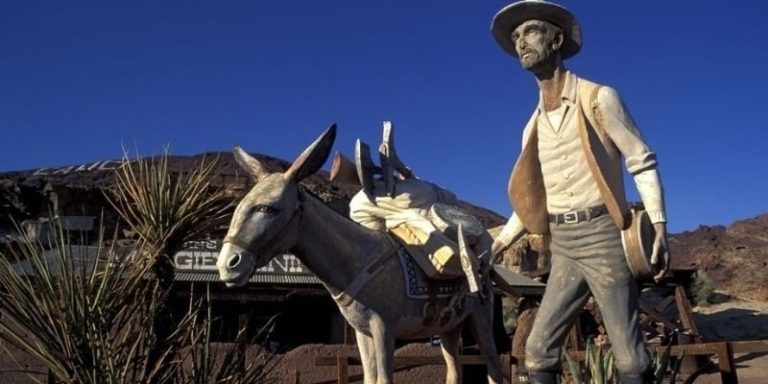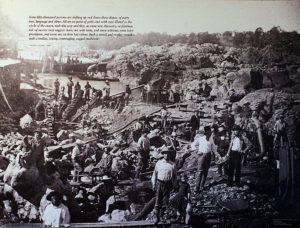This Week in History: January 23-29
The California gold rush, the end of the Vietnam War, and the 18th Amendment ratified.
By: Kelli Ballard | January 23, 2022 | 924 Words

(Photo by Bruno PEROUSSE/Gamma-Rapho via Getty Images)
History is important because it helps us avoid the same mistakes in the present or future. We learn about ourselves and our countries. As Martin Luther King, Jr. said, “We are not makers of history, we are made by history.”
January 23-29
January 24, 1848: The California Gold Rush Began
On this day, James Wilson Marshall, originally from New Jersey, discovered gold while building a water-powered sawmill. The land was owned by John Sutter, a German-born Swiss citizen who founded the colony Nueva Helvetia (New Switzerland), which later became the city of Sacramento.
As Marshall worked on the sawmill, he found flakes of gold in the American River near Coloma, California. “It made my heart thump, for I was certain it was gold,” he said at the time.
Just days after the discovery, the Treaty of Guadalupe Hidalgo was signed, which ended the Mexican-American War. California was given to the United States as part of that treaty.

(Photo by Spencer Weiner/Los Angeles Times via Getty Images)
Although Marshall and Sutter tried to keep the gold a secret, it wasn’t long before word spread. In March, San Francisco storekeeper Sam Brannan paraded through town showing a vial of gold that had been found at Sutter’s Creek. By June, three-quarters of the men in the city had left to seek their fortunes.
The Gold Rush really got going in December, after President James K. Polk made this announcement: “The accounts of abundance of gold are of such an extraordinary character as would scarcely command belief were they not corroborated by the authentic reports of officers in the public service.”
The Gold Rush had begun. Before 1848 and the discovery of gold, there were less than 1,000 settlers living in the area. By the end of 1849, the population of settlers had swelled to around 100,000. By 1852, at the peak of the Gold Rush, a total of $2 billion worth of the precious metal had been extracted.
January 23, 1933: The 20th Amendment Adopted
Section 1 of the 20th Amendment reads: “The terms of the President and the Vice President shall end at noon on the 20th day of January, and the terms of Senators and Representatives at noon on the 3d day of January, of the years in which such terms would have ended if this article had not been ratified; and the terms of their successors shall then begin.”

(Getty Images)
Have you heard of the term “lame-duck”? This is the time between when the old president leaves the White House and the new president is inaugurated. Before the 20th Amendment was adopted, the new president didn’t take office until March 4. Since elections are held in November, this gave the outgoing president a lot of time to make changes. Now, the new president begins his term in January. The 20th amendment also established what happens when a president dies in office.
January 27, 1973: End of the Vietnam War
The Vietnam War was one of the longest wars in America’s history. More than 58,000 Americans were killed, 2,500 declared missing, and 300,000 wounded. Another 566 became prisoners of war held by the North Vietnamese. More than three million people were killed during the conflict, and half of those were Vietnamese civilians.
In the United States, it was a time of civil unrest. Demonstrators protested the war and called for peace instead. The country was divided, and the pressure was on to end the war, which had officially started in 1954.
On this date in 1973, President Richard Nixon signed the Paris Peace Accords, which promised to remove all U.S. troops in the area within 60 days, finally ending the war.
January 29, 1919: 18th Amendment Ratified
The 18th Amendment to the Constitution reads:
“After one year from the ratification of this article the manufacture, sale, or transportation of intoxicating liquors within, the importation thereof into, or the exportation thereof from the United States and all territory subject to the jurisdiction thereof for beverage purposes is hereby prohibited.”
Ratified on this day, it would take 14 years – until December 5, 1933 – for Prohibition to end. The idea was to ban alcohol and prevent drunkenness among the public, but many suggest it backfired. Organized crime rose, providing the big business of bootleg liquor and underground clubs. The 18th Amendment was eventually canceled by the 21st Amendment in 1933.
Other Notable Mentions
January 23, 1849: Elizabeth Blackwell became America’s first woman doctor.
January 23, 1907: Charles Curtis became the first Native American to serve in the U.S. Senate, and later was President Herbert Hoover’s vice president.
January 24, 1895: Queen Liliuokalani was forced to abdicate her throne, ending Hawaii’s monarchy. Hawaii was then annexed by the U.S. but didn’t become a state until 1959.
 January 25, 1533: King Henry VIII married Anne Boleyn.
January 25, 1533: King Henry VIII married Anne Boleyn.
January 25, 1959: American Airlines made the first transcontinental U.S. flight from California to New York with a Boeing 707.
January 25, 1961: President John F. Kennedy held the first live televised presidential news conference.
January 26, 1788: The British set up a settlement at Sydney Harbor in Australia with 778 convicts to establish a penal colony.
January 27, 1967: A fire inside Apollo 1 during a launch simulation killed three astronauts: Air Force Colonels Virgil I. Grissom, Edward White II, and Commander Roger B. Chaffee.
January 28, 1915: An Act of Congress created the U.S. Coast Guard.
January 28, 1986: The U.S. Space Shuttle Challenger, only 74 seconds into its flight, exploded, killing all seven people aboard.
Remember, as Edmund Burke said, “Those who don’t know history are destined to repeat it.”
















